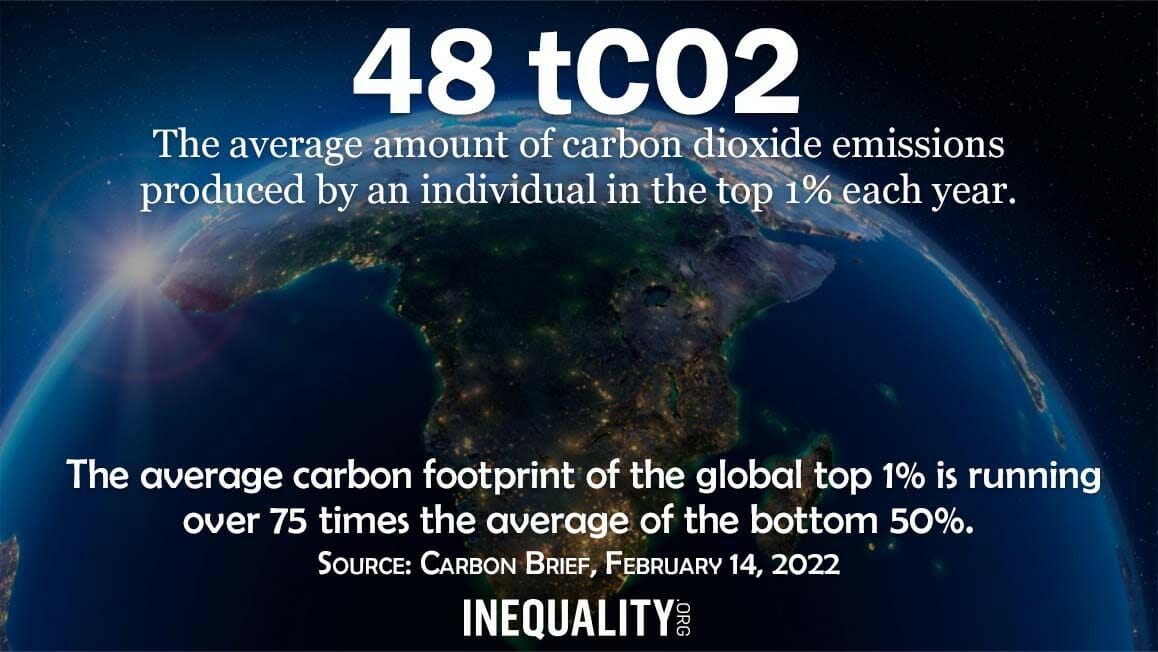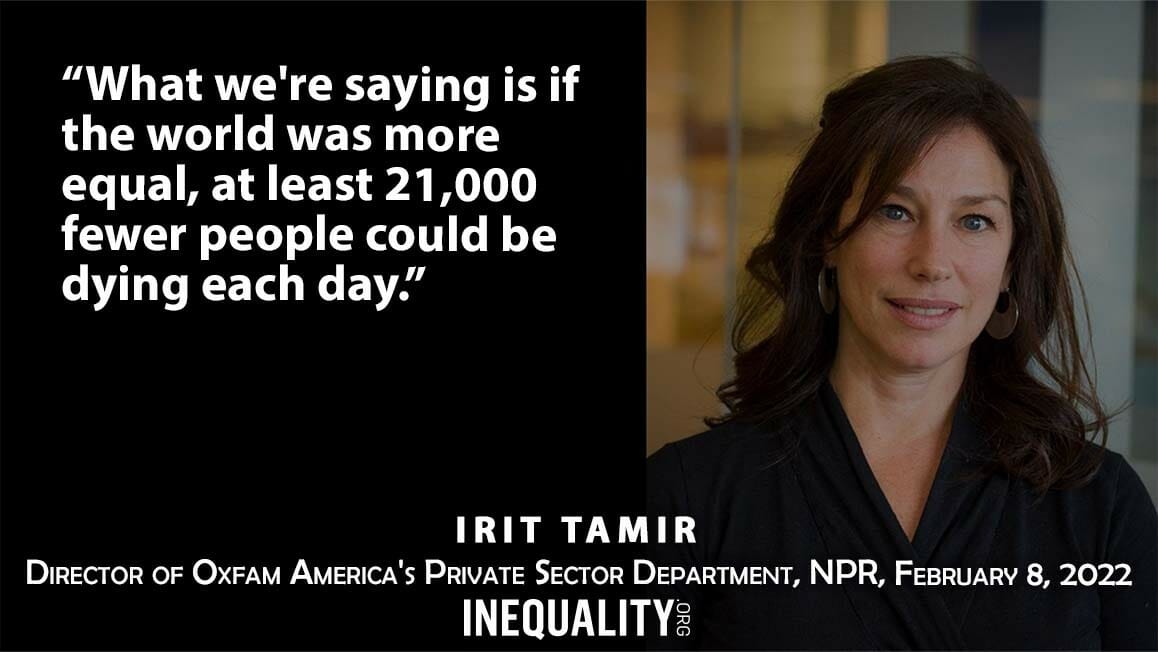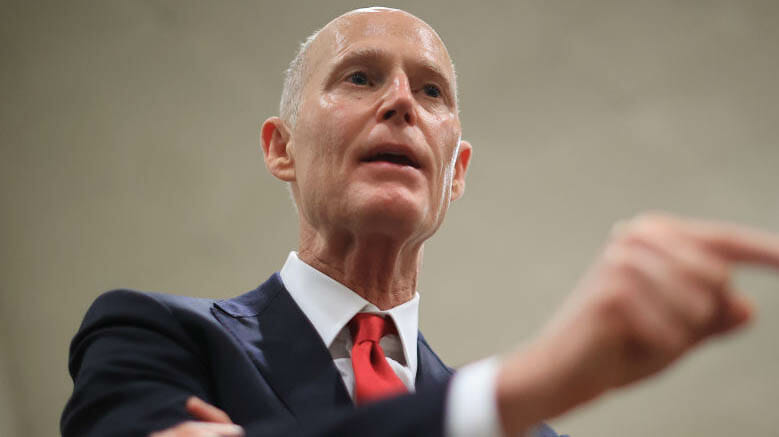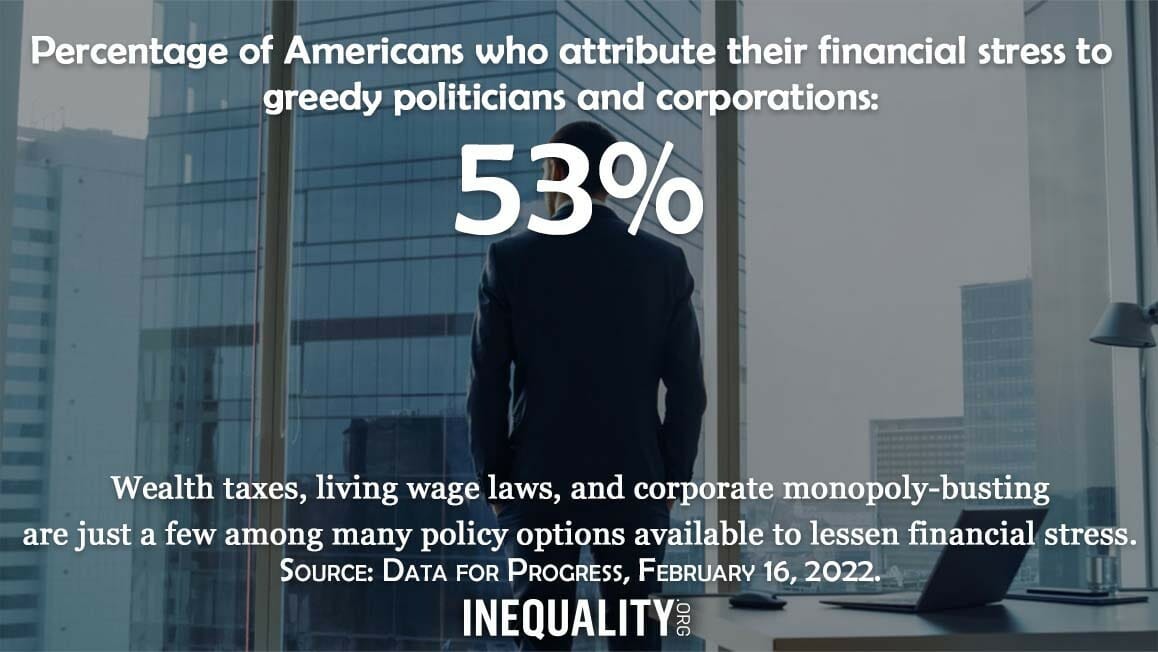| THIS WEEK |
Tomorrow evening, President Joe Biden will deliver his first State of the Union address. He faces a nation with a great deal on its mind, everything from the ongoing conflict in Ukraiane to the rising cost of consumer goods and an impending Supreme Court battle royale.
For our part, we’re hoping the president’s address will commit his administration to using every tool in its executive action toolbox to reduce inequality. The president could, for instance, cancel student debt. He could steer federal contracts to companies that share rewards with workers. He could employ the power of the public purse, as our co-editor Sarah Anderson explains, to reduce economic, gender, and racial inequality.
And just how unequal have we become as a nation? Take a look online at our comprehensive and regularly updated Inequality.org fact pages and draw your own conclusions!
Chuck Collins and Rebekah Entralgo,
for the Institute for Policy Studies Inequality.org team
|
|
| |
|
| INEQUALITY BY THE NUMBERS |
 |
|
|
|
| |
|
| FACES ON THE FRONTLINES |
 |
| Supporting Black Worker Organizing in the South |
Marc Bayard has led the Black Worker Initiative at the Institute for Policy Studies since 2014. He’s helping build a supportive climate for Black worker organizing, particularly in the U.S. South. Many organizers consider this deeply conservative region a daunting challenge, but Bayard sees hope in the area’s untapped well of dynamic Black worker leaders.
In a new American Prospect article, Bayard points to the high success rates of union drives at majority-Black workplaces, particularly when Black women lead the campaigns, and he’s spent much of the past two years working with elected officials and activist leaders on the union drive at the Amazon warehouse in Bessemer, Alabama. Black workers make up 85 percent of that workforce, and they’re leading the union campaign.
Bayard has just released a survey showing that nearly two-thirds of all residents — and 78 percent of Black residents — in the county around the Bessemer warehouse support the union effort. Notes Bayard: “It is deeply encouraging to see so many local community members supporting one of the most momentous labor organizing campaigns in recent decades.” |
|
| |
|
| WORDS OF WISDOM |
 |
|
|
|
| |
|
PETULANT PLUTOCRAT
OF THE WEEK |
 |
| This Deep Pocket Wants the Poor to Reach Deeper |
| Florida’s Rick Scott, our richest U.S. senator, has stumbled upon a major national problem that he’s vowing to fix — if voters give his Republican Party a Senate majority in this November’s elections. That problem? Intones Scott: “Currently over half of Americans pay no income tax.” That happens to be true. Some 57 percent of U.S. households will pay no federal income tax for 2021 because they earn too little for this federal levy to apply. But virtually all these households pay a variety of other levies, including sales and property taxes. Scott’s just-released 11-point plan to “Rescue America” would force all households, even the poorest, to also pay some federal income tax because Americans, says Scott, “want everyone to pay their fair share.” Except, apparently, people as rich as Scott himself. The Treasury Department last fall reported that America’s top 1 percenters are dodging some $163 billion annually in federal taxes. Scott wants to make that dodging even easier. His “Rescue America” plan promises to “immediately cut” IRS funding and staff by 50 percent. |
|
| |
|
| BOLD SOLUTIONS |
 |
| Pro-Union Organizing Rules for Federal Workers |
President Biden recently signed an executive order that didn’t make national headlines or grace many social media feeds. But this order requiring labor agreements for large-scale federal construction projects could be a game-changer, a sign that his administration is taking to heart recommendations from a White House Task Force on Worker Organizing and Empowerment that encourage the use of federal contracting and grant-making tools to boost union participation and raise labor standards.
Phil Mattera of Dirt Diggers Digest is calling the new Biden executive order “heartening,” but also stressing that only legislative action can enact the “substantial measures” necessary to reverse the decline of private sector unionization. Read more on what the Administration has already done — and what Congress should do going forward. |
|
| |
|
| GREED AT A GLANCE |
 |
|
|
|
| |
|
| TOO MUCH |
 |
| How Did Flying Cars Become the Next Big Thing? |
| Someday soon, almost certainly within the next three years, automobile-sized “transportation vehicles” are going to be lifting straight up off the ground, hovering in the air, and then shooting off into the distance at speeds approaching 200 miles per hour. That vision is thrilling deep pockets the world over, from billionaire celebs like Google’s Larry Page and LinkedIn’s Reid Hoffman to top execs at corporations ranging from Boeing to Virgin Atlantic. A bright new, environmentally friendly, flying-car future — all these heavy-hitters would like us to believe — will shortly be upon us. But not everyone is buying the hype. Indeed, the emerging flying car craze may end up providing us with a perfect case-study of who gets to see technology “solve” their problems in deeply unequal societies — and who gets to see their problems just continue to fester. Inequality.org’s Sam Pizzigati has more. |
|
|
|
| |
|
| MUST READS |
What's on Inequality.org
Sarah Anderson, What Can Biden Say About the Economic State of Our Union? We need more than strong jobs numbers. The president should keep pushing a bold legislative agenda while deploying every executive tool at his disposal to achieve a more equitable economy.
Connor Sanchez and Dedrick Asante-Muhammad, We Cannot Separate the Movements for Black Electoral Power and Economic Power. Civil rights leaders of the 1960s understood that without political power, racial economic gaps would persist.
Ellen Moore and Jen Moore, A Sea of Trouble: Seabed Mining and International Arbitration in Mexico. In the Gulf of Ulloa, a U.S. treasure-hunting company turned seabed mining outfit poses a dire risk to the environment.
Elsewhere on the Web
The 100 Most Overpaid CEOs, As You Sow. The companies with the most overpaid CEOs once again suffer lower returns for shareholders than the average S&P 500 company.
Helen Thompson, The age of plutocracy, New Statesman. How the rich have captured Western democracies.
Allison P. Davis, A Vibe Shift Is Coming. Will any of us survive it?, The Cut. Trends are shifting faster and faster, thanks to social media and its push for consumerism. But that begs the questions: as fads come and go quicker than ever, how is anyone supposed to keep up?
Alia Shoaib, California lawmakers introduce bill to tax 'extreme wealth,' proposing new 1.5% tax on state's billionaires, Business Insider. Fortunes of more than $50 million would face a smaller annual levy.
Ayla Ellison, Top 5 billionaires in US healthcare, Becker’s Hospital Review. The fortunes keep on coming.
Economists propose a new way to measure unfair inequality, Phys.org. Among the European nations and the United States, only Greece sports more inequality than the U.S., under this new measure.
Katharina Pistor, Coding Capital, Institute for New Economic Thinking. How our legal system protects wealth and why the rules of the game always seem just out of reach. |
|
| |
|
| A FINAL FIGURE |
 |
|
|
|
| |
|
| BE THE 1% (NO, NOT THAT 1%) |
 |
Our goal for 2022: that 1% of our Inequality.org subscribers become monthly sustainers and help grow our newsletter and research efforts. Be the 1%, for as little as $3 a month! |
|
|
|
| |
|
|